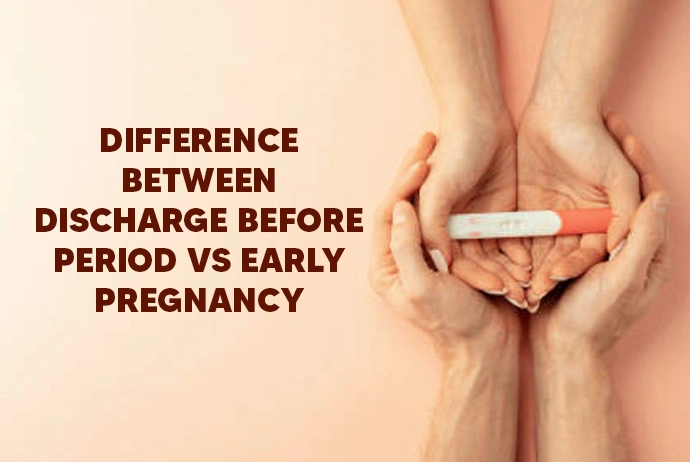
Dr. Aruna Ashok MBBS, MS OG, DNB OG
- Clinical Director

Have you ever stopped to wonder, Is this just pre-period discharge or could it be early pregnancy? It's a common question! Discharge—also called cervical mucus—changes during your cycle and can offer clues. Let's explore the
First things first: vaginal discharge is normal. It's a natural mix of fluid, cells, and good bacteria that helps:
Think of it like nature's way of keeping your private area healthy and clean.
Your discharge shifts with your hormones:
These changes happen inside your uterus, where hormones like estrogen and progesterone ebb and flow in a rhythmic cycle.
Characteristics of pre period discharge:
Example: Imagine your discharge is like a soft lotion that helps prepare your body for the next stage. It's part of winding down your cycle before your next period.
Typical traits of early pregnancy discharge:
Your body is quietly building a protective barrier called leukorrhea to support pregnancy.
| Feature | Pre Period Discharge | Early Pregnancy Discharge |
|---|---|---|
| The timing | Luteal phase, a few days before the period | Right after conception, continues past the missed period |
| Consistency | Thick, creamy, sticky | Thin, watery, milky |
| Colour | White, off white, sometimes yellowish | Clear or milky white |
| Volume | Moderate to low | Increased, more than usual |
| Odour | Mild, maybe musky, usually odourless | Usually odourless |
| Other Symptoms | PMS signs: cramps, mood swings, breast pain | Pregnancy signs: nausea, fatigue, tender breasts, frequent urination |
Sara noticed a thin, watery discharge a week before her period. It was more than usual, and she felt tired. When her period didn't show up, she took a test—and it was positive!
Takeaway: A thin, watery discharge with additional symptoms may appear during early pregnancy.
Leah always gets thick, creamy discharge a few days before her period. Her usual cramps and mood swings accompany it. She tracks it every month and knows when her body enters PMS mode.
Takeaway: Recognizing your "usual" pattern helps spot differences.
Your cervix and comfy vaginal environment team up to adapt to your body's needs.
Look for these signals:
If these fit and discharge look different, take a test after your missed period for reliable results.
Talk to a doctor if the discharge is:
These could be signs of infections like yeast or BV—not just cycle or pregnancy changes.
1. Can thick white discharge mean I'm pregnant?
Yes, it can—but thick discharge usually appears before your period, too. Focus on timing, quantity, and other symptoms, such as fatigue or missed periods.
2. How soon after possible conception does discharge change?
Changes can begin about 1–2 weeks after ovulation when implantation occurs. You may notice watery or milky mucus around the week before your expected period.
3. Is it normal to see discharge changes every cycle?
Yes, changes through your menstrual cycle are regular—from thick after your period to stretchy during ovulation, then creamy before the bleed.
4. Does discharge smell different in pregnancy?
Normal early pregnancy discharge should be odourless or have a mild scent. A strong or foul smell, even in early pregnancy, could signal infection.
5. Can stress or infections change discharge?
Yes. Stress can affect your hormone rhythm, altering mucus. Infections like yeast or bacterial vaginosis (BV) can cause smelly, itchy, or coloured discharge (yellow, grey, or green)—these require medical care.
So, what's the takeaway?
But discharge alone isn't enough to confirm pregnancy. It's a helpful clue but not proof. A pregnancy test is the gold standard—best used if you miss your period or suspect early pregnancy.